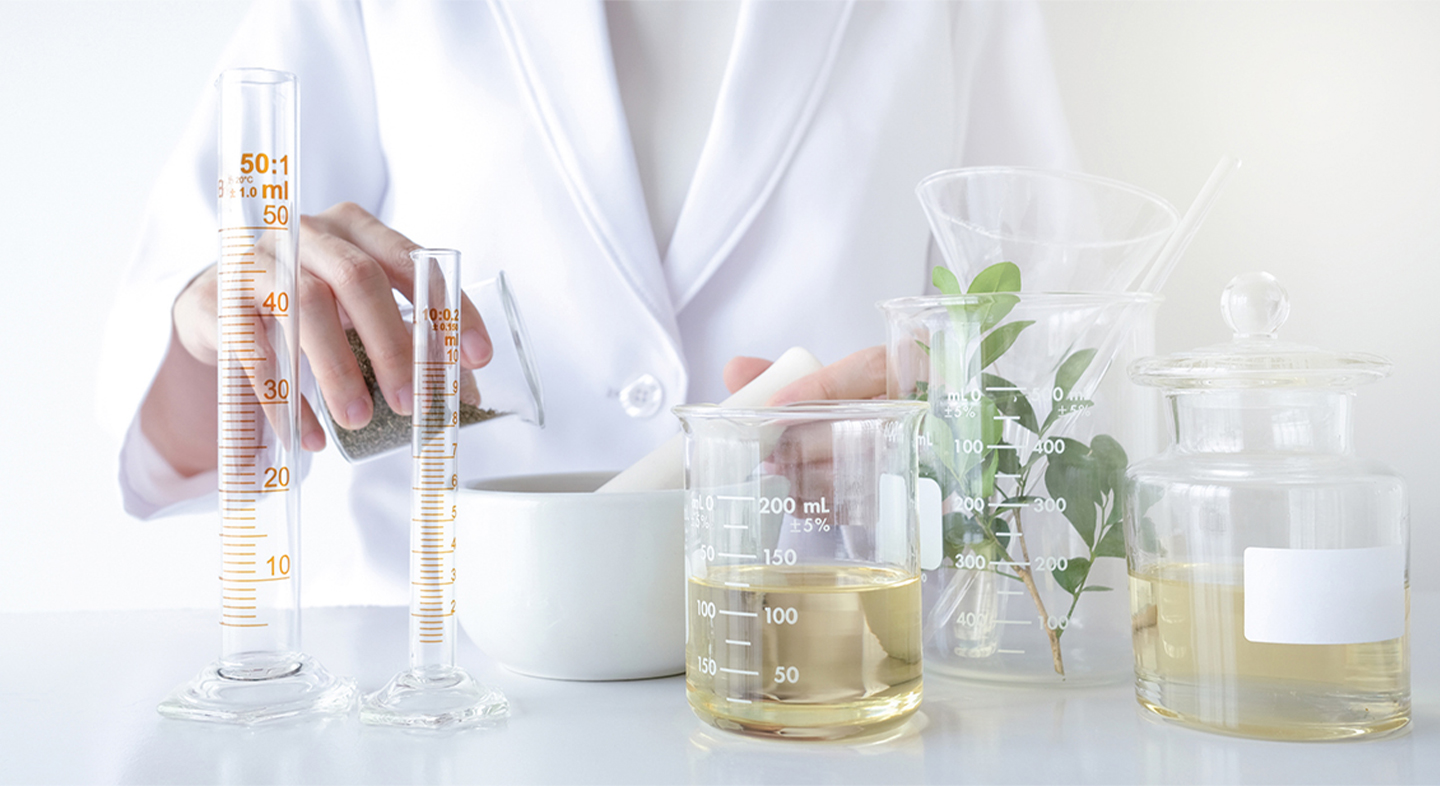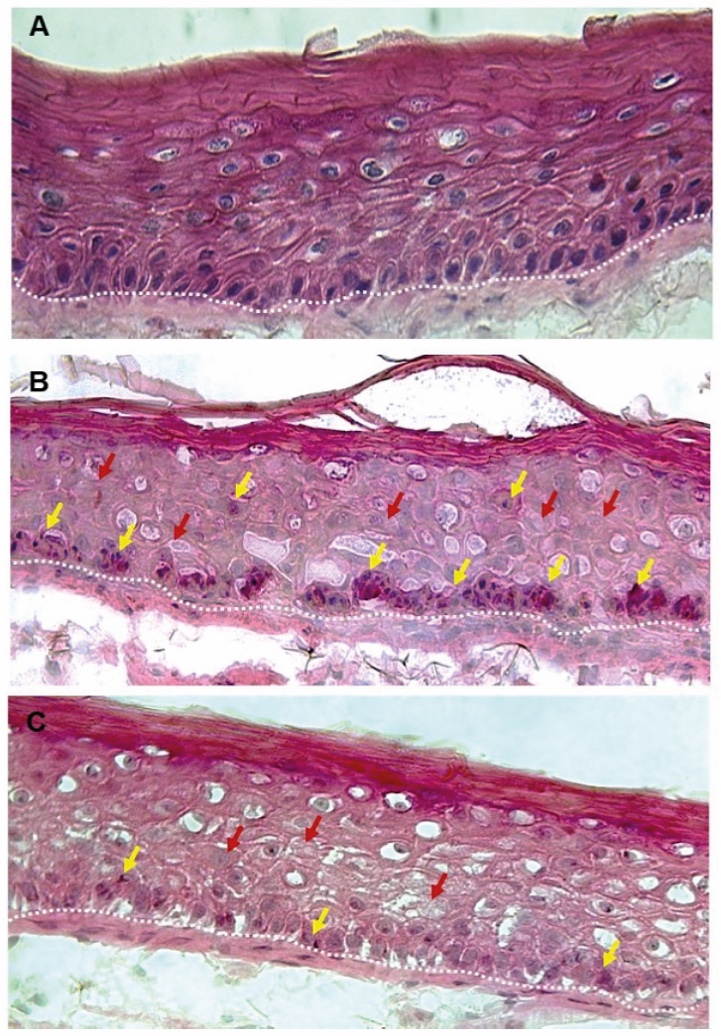
Regulation
on
Skin care
peer-reviewed
Cosmetic claims: Cosmed sorts the
truth out from the lies
CATHERINE APOLINARIO
Regulatory affairs manager at COSMED
ABSTRACT: As consumers become more concerned about product composition and environmental impact, cosmetic brands are making various claims, some of which can be misleading or unregulated. The rising trend of “Clean Beauty” encourages transparency but lacks formal regulation, often leading to ambiguous messaging. Recent efforts to combat greenwashing include new directives aimed at ensuring truthful environmental claims, with stricter rules coming into effect in the next years. Cosmed deciphers 5 trendy claims.
“
“A study in healthy women providing probiotic yogurt for four weeks showed an improvement in emotional responses as measured by brain scans”

Figure 1. Skin Section with Microbiome. Most microorganisms live in the superficial layers of the stratum corneum and in the upper parts of the hair follicles. Some reside in the deeper areas of the hair follicles and are beyond the reach of ordinary disinfection procedures. There bacteria are a reservoir for recolonization after the surface bacteria are removed.
Materials and methods
Studies of major depressive disorder have been correlated with reduced Lactobacillus and Bifidobacteria and symptom severity has been correlated to changes in Firmicutes, Actinobacteria, and Bacteriodes. Gut microbiota that contain more butyrate producers have been correlated with improved quality of life (1).
A study in healthy women providing probiotic yogurt for four weeks showed an improvement in emotional responses as measured by brain scans (2). A subsequent study by Mohammadi et al. (3) investigated the impacts of probiotic yogurt and probiotic capsules over 6 weeks and found a significant improvement in depression-anxiety-stress scores in subjects taking the specific strains of probiotics contained in the yogurt or capsules. Other studies with probiotics have indicated improvements in depression scores, anxiety, postpartum depression and mood rating in an elderly population (4-7).
Other studies have indicated a benefit of probiotic supplementation in alleviating symptoms of stress. In particular, researchers have looked at stress in students as they prepared for exams, while also evaluating other health indicators such as flu and cold symptoms (1). In healthy people, there is an indication that probiotic supplementation may help to maintain memory function under conditions of acute stress.
INTRODUCTION
Introduction
As consumers become increasingly concerned about the composition of products and their environmental impact, more and more claims around product composition and sustainability are being made on cosmetic products. However, these claims are very borderline, sometimes even not authorised and potentially misleading consumers or denigrating the competition.
Cosmed deciphers related key claims, their regulatory framework and level of compliance with the European regulations.
Ingredients: The "free from" and "with" claims
“Free from" claims must comply with precise criteria to avoid being judged misleading or ambiguous for consumers. The authorities require compliance with the legislation and check of the truthfulness of the claims.
Some "free from" claims are deemed unacceptable, particularly those that cannot be verified (such as "free from endocrine disruptors") or those that denigrate regulated authorized substances (for example, "free from parabens").
Conversely, certain "free from" claims may be tolerated if they provide clear and useful information to consumers for making their choice, particularly for specific skin conditions, or for ethical or specific lifestyle reasons (such as "alcohol-free" for sensitive skin, fragrance-free, etc.).
According to regulation 655/2013 and its technical document, if a product claims that it contains a specific ingredient, the ingredient should be deliberately present. Thus, claims 'with' must be approached on a case-by-case basis, as there is no threshold limit for highlighting an ingredient. It therefore depends on the ingredient itself, but also on the concentration at which it is effective.
These rules should be followed to ensure a compliant ‘with’ claim:
- Always consider whether the claim could mislead a consumer
- The claim must comply with Regulation (EU) No 655/2013, in particular the criteria of truthfulness, substantiation and sincerity;
- The highlighted ingredient must be present in the product in a concentration that is more than symbolic. It must not be present for the sole purpose of being claimed ("alibi" ingredient);
- When a claim of effect, even an implicit one, is associated with the claimed ingredient or the finished product, it must be duly justified with robust support:
- The ingredient must be incorporated at least at the concentration for which an effect has been demonstrated.
- When other, less noble ingredients provide a property similar to that claimed, the tests must prove that the effect is indeed due to the highlighted ingredient.
Nevertheless, the cosmetics industry has difficulties to properly interpret the regulatory framework and comply with the requirements, as evidenced by a report from France's Directorate-General for Competition, Consumer Affairs and Fraud Control (DGCCRF), which inspects a large number of cosmetic products every year. They inspected 336 operators on "free from" claims and found 40% of non-compliance. As for claims highlighting the presence of an ingredient 'with', anomalies were detected in 33% of the 389 establishments inspected. These figures are up, given that 31% of anomalies were detected in 2020.
“Not tested on animals”
Despite the ban on displaying the words "not tested on animals", some brands continue to use logos or pictograms. However, as these logos are deemed equivalent to the written statement by the supervisory authorities, they are therefore also banned. The same applies to logos from private labels such as crueltyfree, leaping bunny, etc.
Today, it is possible to claim around cruelty free if, and only if, the brand or private label engagement is associated with another additional benefit such as veganism or the fact that the brand does not sell products in China, a country where animal testing is still compulsory in most cases. It is also possible to link this claim to the company's values "we are committed to fighting animal cruelty...".
Nevertheless, these statements continue to perpetuate the false idea that certain cosmetic products on sale in the European Union are still tested on animals, which is obviously not the case.
Clean Beauty
“Clean Beauty" has become an essential part of the cosmetics market, giving rise to new ways of formulating, communicating and selling, and encouraging brands to be more transparent about the composition of their formulas and their impact on the environment.
“Clean Beauty" does not yet have an exact, official definition, but it is generally made up of natural ingredients and aims to be "greener", more responsible, without chemical or controversial ingredients.
This trend can be accompanied by 'blacklists' of ingredients, more or less visible to consumers. If these lists are displayed, particularly on the website, they can be interpreted as "free from" claims and, in most cases, do not comply with European regulation on claims common criteria.
As clean beauty is not defined in the same way from one brand to another, it is advisable to be as transparent as possible by explaining to consumers what aspects of the product are 'clean'.
Environmental claims
The chapter on environmental claims is still being written. The fight against greenwashing is essential to support the transformation of consumption patterns and ensure consumer confidence in the ecological transition. In 2021 and 2022, the DGCCRF has carried out an investigation into environmental claims used to promote non-food products and services.
1 time out of 4 the claims were problematic:
- Too global to be proven, such as "preserves the environment" or "ecological".
- Imprecise or ambiguous, misleading the consumer, such as "recycled" for a product for which only the packaging is recycled.
- Unjustified
- Illegal, such as the use of "green" logos for chemical products
Since then, too global claims such as "environmentally friendly" have been banned in France, and others such as "biodegradable" can only be used if they are specific enough and duly and precisely justified.
The European regulatory framework is currently being drawn up, covering both the type of claims that can be made and the related justification criteria, certification is even under consideration for certain claims.
On claims themselves, a new rule has been published in February 2024 that will improve product labelling and ban the use of misleading environmental claims. It aims also to protect consumers against unfair commercial practices. The directive 2024/825 amends the Unfair Commercial Practices Directive (UCPD) and the Consumer Rights Directive.
This directive bans some claims such as:
- neutral, reduced, or positive impact on the environment in terms of greenhouse gas emissions (CO2 neutral, Carbon neutral)
- generic environmental claims like green, nature friendly
- environmental performance without clear and verifiable commitments
On the justification of environmental claims, in March 2023, the Commission adopted a proposal for a Directive on Green Claims (1). To ensure consumers receive reliable, comparable and verifiable environmental information on products, the proposal includes
- clear criteria on how companies should prove their environmental claims and labels
- requirements for these claims and labels to be checked by an independent and accredited verifier and
- new rules on governance of environmental labelling schemes to ensure they are solid, transparent and reliable
Cosmetic trends evolve rapidly, whereas regulations take longer to be put in place. It's worth noting that regulations very often emerge after some abuses from the industry have occurred. So it is important to monitor the market and keep an eye on marketing messages (2).
Conclusion
The future of cosmetics lies in the continued evolution of holistic approaches which represents a transformative shift in the industry, merging scientific advancements, natural ingredients, and wellness principles. By understanding and embracing the interconnectedness of these elements, the cosmetics industry can cultivate products that not only enhance external beauty but also contribute to the overall well-being of individuals and the planet.
The interplay between beauty from within and topical cosmetics is the key for future products. The integration of biotechnology and green chemistry is revolutionizing cosmetic formulations, offering sustainable and biocompatible alternatives.
Developers can implement blockchain to trace the journey of ingredients from source to product. Nevertheless, the efficacy of the natural products should be scientifically proven. Marketers can communicate transparency as a brand value, and parallelly educate consumers by highlighting how specific ingredients contribute to radiant and healthy skin.
By embracing the synergy between these approaches and leveraging scientific advancements, the cosmetics industry can provide consumers with comprehensive beauty solutions that cater to both internal and external dimensions of beauty.
References and notes
- Proposal for a Directive on Green Claims Details
- To stay up to date with the latest regulatory developments, Cosmed will be holding its 25th Regulatory Congress on 26 and 27 March 2025. For more information: www.cosmed.fr
